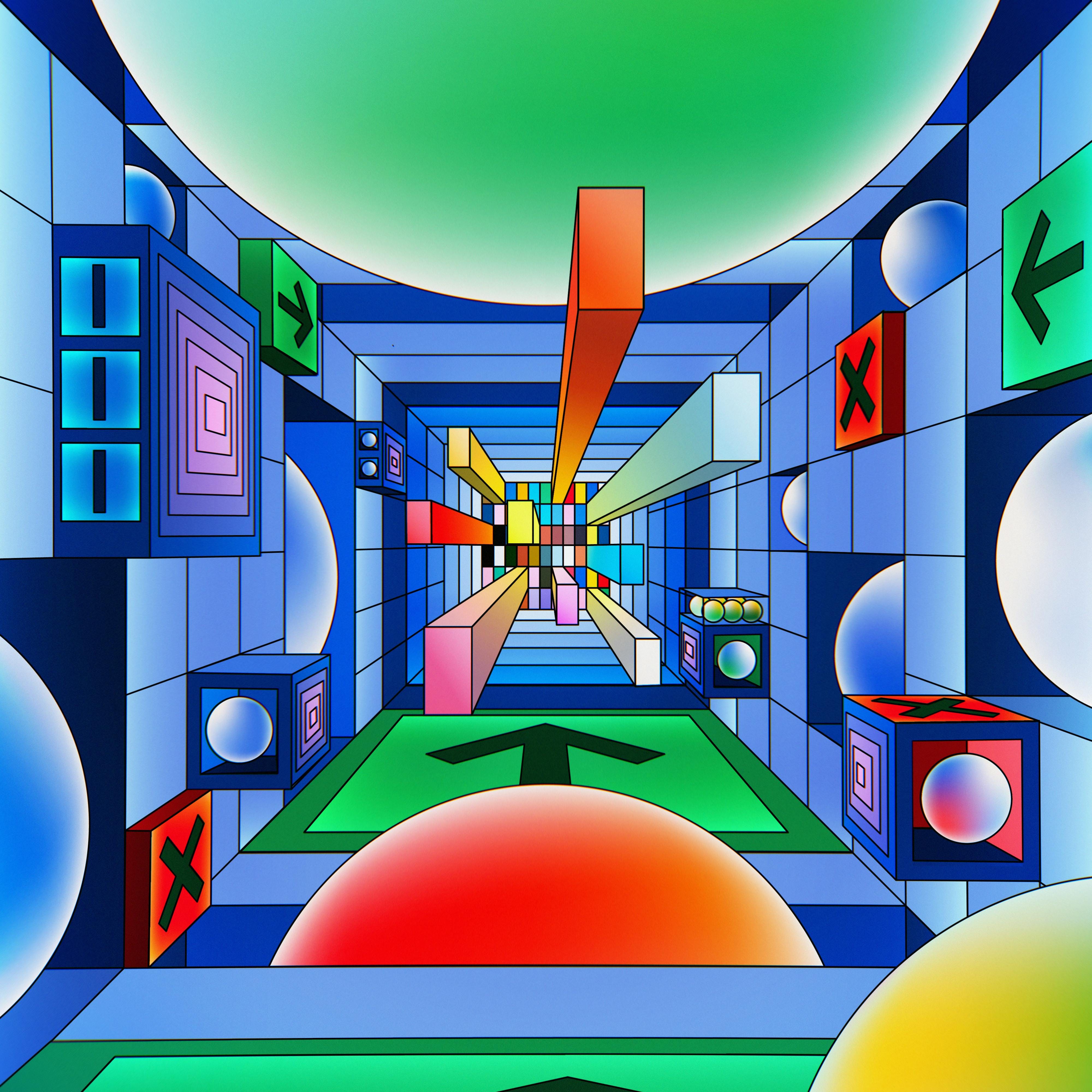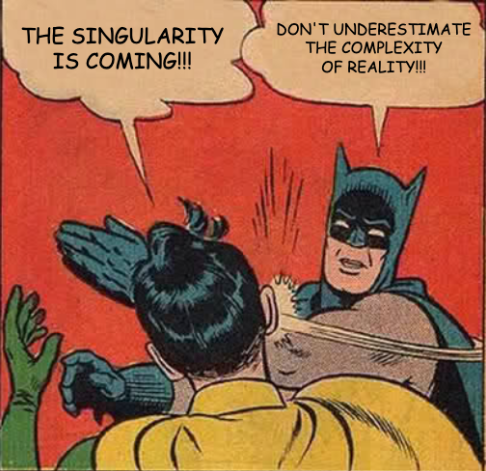Why The Singularity Is Impossible — Or Rather, Why It's Just a Bad Word In General
Too many people not reading enough books and not understanding what they are arguing about.
Posted on November 20, 2024

pontificator, a CodeVideo & Full Stack Craft product.Despite the inciting title, I don't want to strawman this argument, so let's pull the definition straight from every keyboard warrior's best friend, Wikipedia:
The technological singularity — or simply the singularity [1] — is a hypothetical future point in time at which technological growth becomes uncontrollable and irreversible, resulting in unforeseeable consequences for human civilization. [2] [3]
The singularity was popularized by Ray Kurzweil, who claims it will occur in 2045.
There's an entire subreddit dedicated to this word, with over 3 million members, awaiting this fated singularity moment, kinda like a religion. It's a bit weird and creepy, to be honest.
I'm about to ruin their (and perhaps your) whole day.
More of a visual learner? This picture essentially sums up my argument:

Mental Masturbation
After reading a few posts on this illustrious (read: sarcasm) singularity subreddit, I'm convinced the vast majority of posters and critical thinkers (read: clueless gamers) assume that the singularity will be some sort of instantaneous moment where afterward, god knows what is going to happen and we'll never know because we'll all be meat bags floating in some primordial soup (or maybe not exist at all, because, you know, the AI will become self-aware and start launching nukes… wait a second, I've seen this movie before). I argue this notion is like the start of a dream: you somehow “know” how you got there, but if you really think about it, you actually can't explain at all how you got there! (Yes, tip of the hat to Inception.)
A “singularity” of this nature would require some sort of magic-level development in multiple areas of science: physics, biology, chemistry, and probably even a bit of math, too. I also mentioned this in my other recent post, Why LLMs will never be AGI. But seeing as there seems to be no shortage of overhyped AI hucksters, I'd figure I'd write another post to keep drilling the message home. (Not to mention that my last post of mine was quite popular 😉)
In short, everyone is using the “singularity” as a crutch just to feel good — i.e. for whatever their mental agenda is — whether they use the singularity as an argument to claim that everyone will be equal, or that nobody will even exist anymore, it's just a feel-good sentiment and since it makes me feel good, it's of course going to happen.
Turned On Its Head — What if the Singularity Already Happened?
If the singularity is just a matter of defining the moment when technological growth becomes uncontrollable, I could think of many points in time where this has already happened.
One could argue the invention of stone tools was the singularity — I mean, since that point in time technological improvements have been uncontrollable (farming, domestication of animals, currency, history, rest of civilization, etc.).
But heck, why stop there? You could argue that stone tools are ultimately a result of us learning how to control fire! Or you know what, screw it! Perhaps the singularity was when cellular life occurred, or even the Big Bang itself! Each moment arguably (and rather easily) fits into our good ol' Wikipedia definition of “singularity”.
Also important to note here for any of these events, it's not like the moment the first occurrence happened, it was everywhere. (When one caveman saw a tree struck by lightning and plucked off a burning branch, it's likely not the case that a tribe 2000 miles away immediately had torches as well. When the very first cells came together in the ancient oceans, it's not likely that the ocean was then instantaneously filled with multicellular life. I say likely because I obviously wasn't there for any of those events. But somehow I feel like I'm correct in this line of thinking.)
My point is that there will never be some paradigm-shifting instant when everything changes within a split second. Everything has always been changing all the time. Yeah, that's a trite sentence, but think about it. Reality doesn't work like a step function where one moment things are X and another moment they are Y. (I get it, if you're chronically online and sit in front of a screen 18 hours a day, it sounds like I am lying. I assure you, as well as the authors of over 100 million+ published books throughout humanity's history, that this is not the case.)
Time Perception
Time, or at least our perception of it, has everything to do with what the singularity “is” (perhaps at this point you're already questioning even what the singularity means — don't worry, I'm not sure I know anymore either) If we argue that the “singularity” indeed was the formation of single cell life, well then the singularity has been going on for over 3 billion years, which even on a scale of the universe, is nearly 25% of the universe's lifetime (so far). Not so instantaneous eh? The whole “AI” nonsense has gone through like 3 “winters” by now. Very strange…. almost as if each time we find more and more truths about how complex our reality really is…
It's so, so, easy to forget that LLMs are just a tool, and just because they feel like real humans because they can stream chat to us, doesn't rule out the dozens of other types of machine learning models and methodologies that may lead to even more intelligent models further in the future. In fact, I almost guarantee this will be the case. I've started drafting yet another post that pokes fun at the fact that the current GPT and LLM hype is based on a single new invention — the transformer architecture. It goes on to talk about how these LLMs are just a tool that are relatively easy to implement with little engineering effort, but they work damn well, and that's why seemingly every company on the planet is just latching on to this identical concept and racing one another to get one of their own “seems-almost-like-a-human-chatbot”. Humans gon' be humans… but more in that next post.
The Signal From Physical Reality is Slow (and Damned Difficult!)
I'll try to drive the point home in as easy of a method as possible. Let's take literally any of the crazed ideas I've seen from the AGI / singularity maximalists, and then I'll present in simple terms what science is missing for that outcome to occur. I'll try to do my best to think of them myself here:
-“They'll (the robots) kill us all instantly with a nanobot virus that travels around the world even faster than the speed of light!”
Okay, that's a good one, this one requires:
-faster than speed of light travel (lol)
-virus that instantly kills (we know of no virus that is even close to this behavior)
Or how about:
-“They'll copy and entrap every human mind in a time-frozen enclosure by cloning all our consciousnesses there!”
This one requires:
-copying / trapping of consciousness (we don't even understand what consciousness is or how it works)
-stopping of time (sigh… don't even get me started)
Or one I saw recently on our lovely r/singularity:
-“They'll own and operate every business on the planet, producing anything and everything for free!”
This one requires:
-infinite energy with no resource usage? I don't even know where to quite begin critiquing this one…
-take over of 100 year+ legacy systems, especially including the internet which produces more than 400 terabytes of data, a system of complexity that even an ASI would struggle with
Their scapegoat here is always to say that the super-intelligent system would just be able to pull things out of literally thin air. My argument is always to question, “How”? And, if it immediately becomes this stupid loop of me asking how, and them saying “Well we can't know how”, then the conversation is over, I don't have much more to gain from such a conversation.
Another problem here is that many people conflate intelligence with knowledge. Intelligence could be argued as a way to understand knowledge, while knowledge itself is the actual “data” containing all the details. As far as I know, if we had an agent that immediately had the total sum of all humanitarian knowledge, I still don't think we would get faster than light travel, or a virus that could kill anything instantly. Guess why? Because these things have nothing to do with humans or AI. They are rooted all in physics.
Instead, I argue by the exact fact that the only argument is “You can't know how!” applies directly to any agent of reality, no matter how intelligent. You need a mechanism of extracting facts and truths from reality. As far as I know, the scientific method (read: experiments and iteration) is a pretty damn good system, (and even conceding that AGI invents some better system), but it's still gonna be not that fast. As in, no-so-fast-that-multiple-competitors-and-natural-competition-will-arise-as-always-since-its-still-a-part-of-reality-which-is-inherently-complex fast.
“How?”
Now, I know the match-up of myself (a writer, business owner, decade+ software engineer, and reader of the staggering amount of at least gasp 10 books a year) picking a fight with puny chronically-online-gamer no-school subredditors in r/singularity isn't really a fair fight, but I've seen this AGI maximalist talk nearly everywhere on the web, from X to Hackernews to major news outlets. I can't help but feel there are vast gaps in understanding of the underlying technologies. Okay, I'm being too nice: there are vast gaps in understanding of the underlying technologies. I mean, I get the optimism, I'm part of it too, I use some of these tools almost every day, and on top of that, people have made a lot of money betting on AI — in terms of the economy and markets, AI has undoubtedly been a gold mine. But there are constraints to what this stuff can do. It's time to dial down the fantasy world a little bit.
So remember, the next time a singularity / AGI maximalist gets on your nerves, keep asking “How?” until they are forced to realize how lofty and childish their expectations are and are forced to indeed examine, just exactly how, these systems will simultaneously break multiple laws of physics.
Thanks!
As always, thanks for reading my stuff and I hope I gave you a few ideas to knock around in your head.
-Chris
